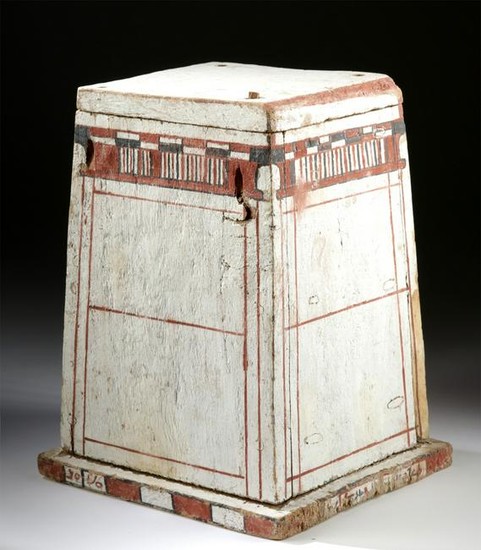Translated Egyptian Painted Wood Canopic Box
Egypt, Late Dynastic Period, 26th Dynasty, Saite Period, ca. 664 to 525 BCE. A wonderful canopic box of a rare form, hand-carved from cedar, with four body panels connected via several original wooden dowels and resting atop a rectangular base, and with a petite lid bearing one original wooden dowel. The body and base periphery are presented in white pigment adorned with thin red and black strips, black outlining in some areas, and an alternating red-and-white motif. One side of the base as well as the inside of the lid display an inscription in early demotic script that, when translated, reads, "…Khnum, our lord…" with characters alternating between an unusual red and black chromatic scheme. While the original contents are unknown, this box was perhaps used as an animal coffin to contain the mummified remains of a petite creature of spiritual significance, such as an ibis or a ram lamb. Size: 10" L x 9" W x 12.6" H (25.4 cm x 22.9 cm x 32 cm).
Interestingly, cedar wood was not native to Egypt. Egypt did not have verdant forests filled with tall trees, and unfortunately most of its native lumber was of relatively poor quality. Thus, they relied on importing to acquire hardwoods - ebony imported from Africa, cedar and pine from Lebanon. One fabulous obelisk inscription by Thutmose III attests to the luxury of treasured hardwoods. It reads as follows, "They brought to me the choicest products...consisting of cedar, juniper and of meru wood...all the good sweet woods of God's Land." The rarity of cedar meant that masks like this example were reserved for those who could afford them.
A stylistically similar example, of a smaller size and covered in polychrome hieroglyphic inscription, hammered for $9,988 at Christie's, New York "Antiquities" auction (sale 9796, December 5-6, 2001, lot 250).
Provenance: private J.H. collection, Beaverton, Oregon, USA; ex-Sands of Time, Washington, D.C.; ex-private S.O. Simonian family collection, Switzerland, acquired in the 1960s and thence by descent, legally imported into the United States in 2016
All items legal to buy/sell under U.S. Statute covering cultural patrimony Code 2600, CHAPTER 14, and are guaranteed to be as described or your money back.
A Certificate of Authenticity will accompany all winning bids.
We ship worldwide to most countries and handle all shipping in-house for your convenience.
#149622
Condition Report: Minor chips and abrasions to base, walls, and lid, with three original dowels missing from lid, fading to areas of original pigmentation and demotic inscriptions, staining in several areas, and several stable hairline fissures. Light earthen deposits as well as nice patina and remains of original pigment throughout.
View it on
Estimate
Time, Location
Auction House
Egypt, Late Dynastic Period, 26th Dynasty, Saite Period, ca. 664 to 525 BCE. A wonderful canopic box of a rare form, hand-carved from cedar, with four body panels connected via several original wooden dowels and resting atop a rectangular base, and with a petite lid bearing one original wooden dowel. The body and base periphery are presented in white pigment adorned with thin red and black strips, black outlining in some areas, and an alternating red-and-white motif. One side of the base as well as the inside of the lid display an inscription in early demotic script that, when translated, reads, "…Khnum, our lord…" with characters alternating between an unusual red and black chromatic scheme. While the original contents are unknown, this box was perhaps used as an animal coffin to contain the mummified remains of a petite creature of spiritual significance, such as an ibis or a ram lamb. Size: 10" L x 9" W x 12.6" H (25.4 cm x 22.9 cm x 32 cm).
Interestingly, cedar wood was not native to Egypt. Egypt did not have verdant forests filled with tall trees, and unfortunately most of its native lumber was of relatively poor quality. Thus, they relied on importing to acquire hardwoods - ebony imported from Africa, cedar and pine from Lebanon. One fabulous obelisk inscription by Thutmose III attests to the luxury of treasured hardwoods. It reads as follows, "They brought to me the choicest products...consisting of cedar, juniper and of meru wood...all the good sweet woods of God's Land." The rarity of cedar meant that masks like this example were reserved for those who could afford them.
A stylistically similar example, of a smaller size and covered in polychrome hieroglyphic inscription, hammered for $9,988 at Christie's, New York "Antiquities" auction (sale 9796, December 5-6, 2001, lot 250).
Provenance: private J.H. collection, Beaverton, Oregon, USA; ex-Sands of Time, Washington, D.C.; ex-private S.O. Simonian family collection, Switzerland, acquired in the 1960s and thence by descent, legally imported into the United States in 2016
All items legal to buy/sell under U.S. Statute covering cultural patrimony Code 2600, CHAPTER 14, and are guaranteed to be as described or your money back.
A Certificate of Authenticity will accompany all winning bids.
We ship worldwide to most countries and handle all shipping in-house for your convenience.
#149622
Condition Report: Minor chips and abrasions to base, walls, and lid, with three original dowels missing from lid, fading to areas of original pigmentation and demotic inscriptions, staining in several areas, and several stable hairline fissures. Light earthen deposits as well as nice patina and remains of original pigment throughout.



